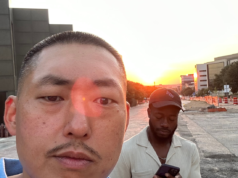Coming out May 14, Unraveled is Cut Throat Finches’ fourth album and the band’s first release in four years, which is notable given that the indie-rockers managed a record every year in their first three years of existence. It’s also notable in that Sean Russell, the principal songwriter on the previous albums, relied on his bandmates a lot more to help him finish songs. In the past, he wrote about love, self-respect, and holding fast through tough times, but Unraveled was written in 2020 and, as a result, is darker than anything that’s come before. It’s cynical even, the result of five people trying to make something beautiful together despite all the ways their lives were ripping at the seams.
The band’s last release, the EP In Event of Moon Disaster, looked for hope in an imaginary tragedy in which the astronauts on NASA’s mission to the moon never made it back, so it’s not as if Russell’s songs are all sunshine and good vibes. But in general, he was excited about that release — at least until COVID canceled live music. “We released Moon Disaster in 2019, right before the pandemic hit, and that was a bummer.”
Russell, never one to sit still for too long, began working on new material. As 2020’s autumn fell, the Cut Throats started recording but in the segmented, socially distanced, piecemeal way that typified such endeavors that year. “We were hopping around different studios. … We were trying to record in short spurts during the day, like get in and out, don’t hang around too long.”
The band recorded at Modern Electric with John Pedigo, at BPL with Todd Pipes, and at Niles City with Joel Raiff. Russell and company finished the record with Taylor Tatsch (Maren Morris, Flickerstick). “We enjoyed the recording process, but some of the technical aspects were not great” from tracking in four different studios. “We just finished recording, like, six months ago, but everything that happened in between just slowed us down.”
Russell said that he and his bandmates each had their own battles, though they didn’t really see how their pandemic struggles seeped into the music until later. “I guess we didn’t really realize [the recurring theme] until we got to the end of recording. The underpinning of all these songs and what stretched [recording out] was what was going on in our own lives.
“This was an album where it was like an absence of reflection,” Russell continued. “It was us trying to take ourselves out of the situation while we were writing, but the reality was there was a lot of discussion of our own addiction problems, our own mental health issues.”
As 2020 turned into 2021 and so on until now, that way life sort of curdled, or fell apart, or took a treacherous, rocky path.
“I don’t want to speak for everybody in the band … but that bounceback, the roaring ’20s that were supposed to happen after the pandemic, never came,” Russell said. “Our addictive nature and mental health problems got worse, and we also had a lot of tragic shit going down.”
Drummer Draya Ruse got into a terrible car accident after delivering her first child in 2020 — and that was only a couple of weeks after getting over a bout of COVID back when catching it was possibly fatal. “They went to the hospital just a week after getting COVID that I gave them,” Russell said.
Russell, unfortunate enough to catch the virus himself, had unwittingly spread it to Ruse and others at a socially distanced election-watching party. “We were on a back porch, all spread out, and people still got it. I felt terrible about it.”
Besides Ruse’s crash, Russell said his compatriots experienced job losses and the deaths of family members. “It was a dark time, and I really feel like, looking back, I can see where we planted some of those feelings in the lyrics.”
Along with the external darkness, Russell found himself suffering a spiritual crisis. The track “Calling Me Out” has a line about trying to get “clean from the outside in,” and while Russell said that song is about not living up to who he wants to be, it’s also “just dealing with my own rejection of church and religion, dealing with that part of my life. It’s so ingrained that it’s hard to walk away from.”
Russell’s ear for melody jumps in the direction of the ’80s Britpop he grew up with, but the song’s melancholy, country-nodding shuffle is a doleful, midtempo march, like having to be a pallbearer in a hurry. The push and pull of melody versus mood is the sound of a person coming to grips with the fact that life was once one way and now it is no longer that. Russell and I talked about Christianity and how the New Testament is essentially just guys writing letters to their friends and also how a lot of Christians don’t want to think about what they’re reading and how his band has forced him to untangle a lot of previously entrenched beliefs that are no longer so black and white.
For all that heavy stuff, however, the album still soars with hooks — lead track “Bad Habit” reminds me of Stone Temple Pilots’ “Sour Girl,” with its melody that kind of sounds like a person being surprised yet unemotional at finding out a lover has been unfaithful. “Call Me Back” is a breezy banger that, in the context of the rest of the album’s darkness, feels like being at a party that was fun until it wasn’t, and now you’re looking for an excuse to go home. Throughout, you still get Russell’s big choruses, which is a good thing because it makes you listen harder for the tonal valleys that follow the melodic peaks. And while the tragedy and bewilderment engendered by the pandemic might have been difficult for the Cut Throat Finches to live through, it has made for some palpably real feelings. Unraveled might be about people coming apart, but it sounds like a band coming together to make their best work yet.












